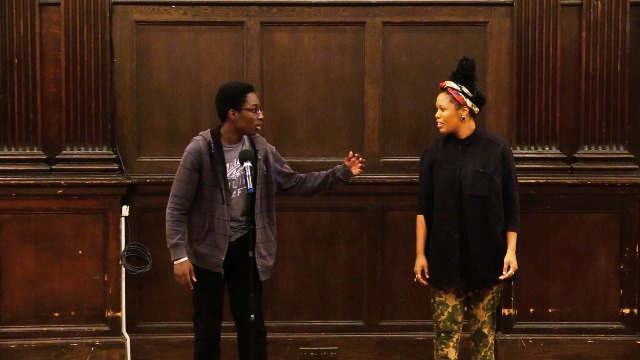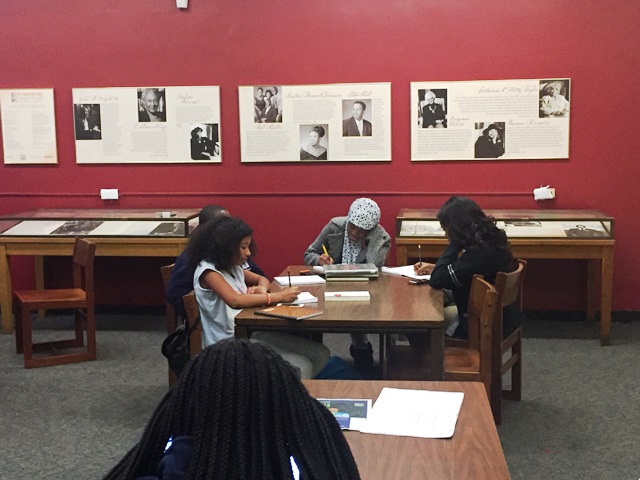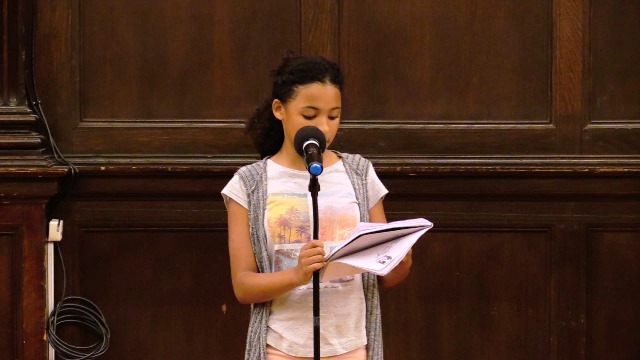Chance the Rapper, Langston Hughes, and Creative Self-Expression Inspire Teens in Newark Library's Spoken Word Workshop
An influential poet led workshops for these Newark, NJ teens, who competed in a national youth poetry slam competition in July.
When I created a wish list of poets to lead teen workshops at the Newark (NJ) Public Library (NPL) a year ago, Jasmine Mans was at the top, but I considered her a reach. While she was a college student, a video of her performing her poem “Nicki Minaj” went viral, which led Glamour magazine to name her one of the Top 10 College Women in 2012. Some of her most popular poems, which celebrate hip hop culture while critiquing the message and influence of some of its biggest contemporary artists, have earned millions of views from teens and adults across social media platforms.
Fortunately for me, Mans is a Newark native who attended Arts High School and returned to her hometown after graduating from the University of Wisconsin. When I filled out her website contact form, I expected to correspond with a publicist or manager, but she responded to me directly. Not only did she live in walking distance of our main branch, but she was looking for a way to build a literary arts program in Newark in the vein of Urban Word NYC and Young Chicago Authors. She responded enthusiastically to my request that she lead workshops at our main branch.

Newark poet Jasmine Mans (right) with eighth grader Kwadjo Otoo. Photos courtesy of Maisy Card
We funded the workshops with grant support from the Victoria Foundation, dedicated to improving the lives of Newark children and families. The grant covered Mans’ honorarium as well as snacks and supplies. We began by advertising the program with flyers, social media, and school visits by Jasmine herself. All of this attracted a diverse set of teens with different educational experiences, including a home-schooled seventh grader, an eighth grader from a charter school, and a college freshman.
Approximately 30 students attended the first session on October 3, 2017. The workshop met once a week for eight weeks. Before jumping into writing poetry, Mans told them her story. In middle school, she was interested in oration and eventually discovered poetry, later participating in the Urban Word NYC program. Throughout high school, she commuted to New York to participate in workshops, slams, and open mics. She eventually competed on the Urban Word NYC slam team at the Brave New Voices festival, the largest youth poetry competition in the world. Her poetry earned her a full scholarship to the University of Wisconsin and has since allowed her to travel the world and work as a full-time writer, artist, and teacher.

Students write during a workshop session.
Mans’s message is effective because she is a living example of what each teen in the workshop can achieve. Her pep talk is a boost of confidence and provides the inspiration students need—because spoken word requires courage. At the first session, she told students their first open mic was in two weeks and encouraged each of them to get up in front of an audience and perform at least two poems.
As the workshop went on, Mans played contemporary artists like Chance the Rapper for students, but also included lessons on historical poetic movements, such as the Harlem Renaissance. One of the first writing exercises was to read Langston Hughes’s “I, Too, Sing America” and rewrite it based on their own identities and experiences. The teens later performed these poems, as well as originals, at their first open mic. Their “I, Too,” poems asserted their pride in their different identities—immigrant pride, LGBTQ pride, Muslim pride, Latinx pride and Black pride. Some teens were nervous, but cheers from the audience reflected that pride back at the performers, proving that even a short writing exercise can lead to an empowering experience. After the second open mic, two weeks later, the teens’ confidence as writers and performers grew further.
Newark teens Khali Raymond and Kwadjo Otoo perform at the July, 2018 Brave New Voices spoken word festival in Houston, TX.
Since then, the program has evolved into so much more than workshops. In January and April 2018, Mans collaborated with two other poets and teaching artists, Nelly Bess and Shelly Spinelli, to hold a series of slam competitions with the goal of creating a Newark slam team. Two preliminary slams were held at NPL in January 2018 and the final slam was held at the Newark Museum in April. More than 300 people attended the final slam, each audience member supporting and cheering on each teen as the final 14 students competed for five spots on the team.
Mans and the team went to Houston, TX, to compete in the 2018 Brave New Voices Festival from July 18-21. The annual competition is divided into four rounds, with fifty teams at the start of round one, and only four teams competing in the finals. With just a few months of preparation time, the Newark team competed in three of the four rounds, making it all the way to the semifinals, where they were one of the top twenty out of fifty teams. We hope to send another team to compete next year.
NPL has recently been awarded a grant from the New Jersey Council for the Humanities, which will allow us to hold more workshops in the summer and fall of 2018.

Student Georgia Lucas performs.
TIPS FOR AN INSPIRING TEEN POETRY PROGRAM
- Engage a local artist. Working with a writer or artist from the same community can be itself an inspiration to teens. Likewise, many successful artists will jump at the chance to work with and encourage students from their own communities.
- Use school visits to attract participants. Before the first series of workshops began, Jasmine Mans visited several high schools in the city, “taking over” English classes, to promote the program.
- Get students and parents involved in fundraising. While we were fortunate enough to have grant funding to pay our teaching artist to run the workshops and buy supplies, Mans and the students also engaged in additional fundraising to pay for some of the expenses to attend Brave New Voices. This included selling screen-printed t-shirts and setting up GoFundMe pages.
- Schedule workshops in 6-8 week cycles. Our first series of workshops lasted eight weeks, during October and November, meeting one day a week for two hours. Mans set the format for the workshop each time, though I was present during each workshop, and we would sometimes meet afterward to discuss our observations of what activities engaged students the most. Usually each workshop began with students reading the poems they wrote based on a take home prompt, a new lecture or lesson on a poetic movement or style, an individual or group writing prompt, performances, and then a new take home assignment or prompt.
- Use the library resources. Encourage teaching artists to use library collections or resources to compliment instruction. Jasmine encouraged her students to browse NPL’s poetry collections, including those in the James Brown African American Room, a collection dedicated to African American life, history, and culture.
- Spoken word is not just for writers. Encourage students with a broad range of interests to participate. During slam competitions, poets aren’t judged on their verses alone, but also their performance. Students interested in debate, oration, and drama will also be drawn to spoken word and can improve their writing and literacy skills while simultaneously honing their performance.
- Don’t worry if students come and go. Spoken word is not for everyone. Some students will love writing, but they might not enjoy getting up in front of a crowd. Still, such programs give teens the chance to try it all out and see which aspects they like.
- Don’t censor. Encourage free expression While teens must know that using racist, abusive, homophobic/transphobic, sexist language is hurtful and wrong, they may feel the need to curse to get their point across. If you want teens to use their authentic voice, don’t censor their language or topic choices. Before a poetry slam or open mic, share this objective with your audience members, including issuing trigger warnings when deemed necessary, so they are prepared.
Maisy Card is a teen services librarian at the Newark (NJ) Public Library and a fiction writer in her free time. Her work has appeared in Agni Online, Sycamore Review, Liars' League NYC, and Ampersand Review.
The job outlook in 2030: Librarians will be in demand
The job outlook in 2030: Librarians will be in demand
ALREADY A SUBSCRIBER? LOG IN
We are currently offering this content for free. Sign up now to activate your personal profile, where you can save articles for future viewing






Add Comment :-
Be the first reader to comment.
Comment Policy:
Comment should not be empty !!!